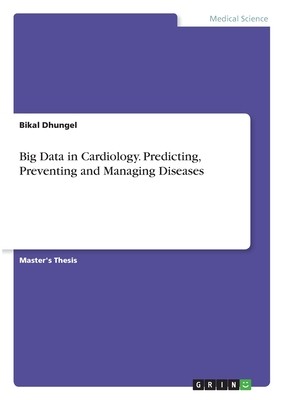
- We will send in 10–14 business days.
- Author: Bikal Dhungel
- Publisher: GRIN Verlag
- Year: 2021
- Pages: 64
- ISBN-10: 3346284387
- ISBN-13: 9783346284389
- Format: 14.8 x 21 x 0.4 cm, softcover
- Language: English
- SAVE -10% with code: EXTRA
Big Data in Cardiology. Predicting, Preventing and Managing Diseases (e-book) (used book) | bookbook.eu
Reviews
Description
Master's Thesis from the year 2020 in the subject Health Sciences - Health Logistics, grade: 1,7, Linnaeus University (School of Informatics), course: Information Systems, language: English, abstract: This study was conducted to analyze this process closer focusing on a case of Cardiology. Conducting a comprehensive literature review and qualitative expert interviews, the impact of big data in the field of Cardiology was explored. The result of the study shows that big data can play a positive role in three aspects: prediction of disease, prevention of disease and management of disease. Big data enables us to build models that can be used to predict the occurrence of disease. Based on this information, actions can be taken to prevent the disease. Data also helps to manage the disease by offering helpful insights. Medical personnel can retrieve the patient data, with the help of AI, they can make faster decisions allowing them to spend more quality time with the patients and reduce cognitive errors. Through the interviews, it was understood that even though the positive role of big data has been acknowledged, the implementation is still a challenge due to various limitations. The challenges lie mainly on technical know-how and domain knowledge. Further challenges were data security and privacy issues that need to be addressed to mitigate the risks that can be caused by them. The examples of big data implementation in various cases like in heart failure prediction or prevention shows a positive picture. The overwhelming majority of case studies analyzed in this regard show an optimistic picture. Due to growing importance and use of smart devices, IoT, genomics and the recent developments in the field of ICTs, it is expected that big data will not only leave a positive influence on the field of Cardiology, it will also change the way medicine is practiced and healthcare is offered. The statement 'Data is the new oil' has been broadly acknowledged due to its wide-
EXTRA 10 % discount with code: EXTRA
The promotion ends in 17d.01:09:56
The discount code is valid when purchasing from 10 €. Discounts do not stack.
- Author: Bikal Dhungel
- Publisher: GRIN Verlag
- Year: 2021
- Pages: 64
- ISBN-10: 3346284387
- ISBN-13: 9783346284389
- Format: 14.8 x 21 x 0.4 cm, softcover
- Language: English English
Master's Thesis from the year 2020 in the subject Health Sciences - Health Logistics, grade: 1,7, Linnaeus University (School of Informatics), course: Information Systems, language: English, abstract: This study was conducted to analyze this process closer focusing on a case of Cardiology. Conducting a comprehensive literature review and qualitative expert interviews, the impact of big data in the field of Cardiology was explored. The result of the study shows that big data can play a positive role in three aspects: prediction of disease, prevention of disease and management of disease. Big data enables us to build models that can be used to predict the occurrence of disease. Based on this information, actions can be taken to prevent the disease. Data also helps to manage the disease by offering helpful insights. Medical personnel can retrieve the patient data, with the help of AI, they can make faster decisions allowing them to spend more quality time with the patients and reduce cognitive errors. Through the interviews, it was understood that even though the positive role of big data has been acknowledged, the implementation is still a challenge due to various limitations. The challenges lie mainly on technical know-how and domain knowledge. Further challenges were data security and privacy issues that need to be addressed to mitigate the risks that can be caused by them. The examples of big data implementation in various cases like in heart failure prediction or prevention shows a positive picture. The overwhelming majority of case studies analyzed in this regard show an optimistic picture. Due to growing importance and use of smart devices, IoT, genomics and the recent developments in the field of ICTs, it is expected that big data will not only leave a positive influence on the field of Cardiology, it will also change the way medicine is practiced and healthcare is offered. The statement 'Data is the new oil' has been broadly acknowledged due to its wide-


Reviews